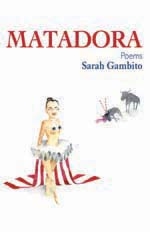|
Web Del Sol presents Sarah Gambito as a Featured Poet for 2005 National Poetry Month. The Poetry Chapbook Paloma’s Light Journal, January 2nd Paloma’s Light Journal: May 8th Paloma and I Admire the Neon Lights
Sarah Gambito holds degrees from The University of Virginia (B.A.) and Brown University (M.F.A.). Her poems have appeared in The Iowa Review, The Antioch Review, The New Republic, Quarterly West, Fence and other journals. She lives in New York City.
"Early
in Sarah Gambito’s book, we learn that 'You cannot be in two
places at once.' In fact, the personality presented in these poems
(they are personal poems; that is to say, they have their own unique
and consistent personality) seems to have come from Elsewhere, on the
way to Everywhere."
"The poems
in Sarah Gambito's first book, Matadora, are sheer juxtapositions of
anything--star fish, Tagalog, frisson-- and the friction very often
adds a political dimension to the poetic. Lovely!"
|
Could you take us to the day when you first realized you were a poet? I was sixteen. I had just found ee cummings. I wanted to get the hell out of Virginia. His poems were full of questions and experiments and theater. Was there a poem that made you a poet? yes. here it is. by ee cummings. since feeling is first my blood approves, we are for each other: then And death I think is no parenthesis What is the childhood of a poet like? A childhood full of books and empty of communication. Kind of monastic. Like you’re eleven years old and working on illuminated manuscripts most everyone can’t read. Do you think Filipino families are generally accepting of poets and artists among them? Why? How was it for you as a poet in your family? The Filipino families I grew up with were not generally accepting of poets/artists. Mothers and fathers of these families were immigrants to this country—my family among them. It seemed that there was a definite push—sometimes explicit sometimes not—that you were raised in America to become someone who wears a white lab coat. Whether it be a doctor, a nurse, a denist, or a dental hygienist. In terms of aesthetics, where do you see yourself in the world of poetry? Oh. I don't know. I suppose I'd say a pastiche of: lyric, confession, avant-garde. If there is one word/one moment/one insight you can bring poetry to, what is poetry all about? Writing a true sentence. How does poetry affect your roles in life? I suppose it doesn't impinge on my other roles in life. I don't think about being a poet, or writing poems. It is just a part of what I do in the world. How do you write a poem? Usually I write because something haunts me. And won't let me go until I give it the right words. Describe the world around you when you write poetry ( e.g. physical space). I'm not picky about surroundings at all. I can write on the subway or at a christmas party. Mostly though, I write in my room or at a cafe. What are your inspiration in poetry? The unsayable, the relentless.
Hopefully, poets are at the fighting edge. It brightened my heart to find out the Maxine Hong Kingston was arrested for protesting this last ridiculous Iraq war. How did your first book come into being? Ostensibly, it began as my thesis in grad school. Is there an ideal reader for your book? I love all readers. What are some insights you can give a young poet? a young poet-of-color? I’d say. Go where you need to go. If you
are meant to write, don’t let anything stop you. Go through
a brick wall if you have to. But first of all, live a life that is
here on
earth. Be generous with yourself and with others. Drink wine.
Go to the movies. Buy someone you love a
|
This vivid, incisive, feminist debut skewers Filipina American gender roles with its delightful sense of humor. With seriocomic tone, these elliptical lyrics reveal illusions and exclusions at the heart of America’s global narrative of economic “progress,” and the attendant loss of cultural identity and memory. At the same time,Matadora challenges traditional Filipina gender norms, beginning with the title which feminizes a word and profession traditionally masculine.
"....employs
a cryptic, staccato style that implies much more than meets the
eye.”
"In
Sarah Gambito’s first book, a world is reborn and so to accommodate
it the
speaker assumes just so many multiple elations, all of them daughters
and sisters of the things of the world. These poems fly in from other
countires. They blur the speed of prayers with alt.rock lyrics. In
the poems continents reverse themselves as if drifting in amniotic
fluid, lines of lineage re-emerge and voices in other languages adopt
themselves to various new forms of speech. The speaker arrives from
time to time. She is like snow. She takes short holidays. She smiles
at birthday cards. She can eat anything that doesn’t criticize her.
Some of her ex-lovers were not teenagers. She flits from Tagalog
to East Villagese. She has a halogen stereo and waits for 'my late
great
Chachi.' She goes to clubs and raw bars and a street in Tagatay.
She tries on her butterfly kite. Through all this, she is the breathless
sum of her various accoutrements: crystal and sea-egg, a borealis,
a lamp, a holidaypipe, a Paloma, a sister. A beautiful book."
|

